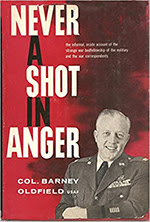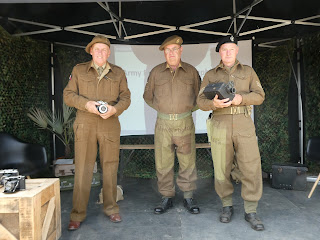In December 1943 an U.S Army jeep appeared on the Six Ways interchange in Clevedon. The occupant, Major Barney Oldfield, and his driver, Corporal Max Shepherd, were scouting for 'a village site in the West Country' which would take about 700 men.
Right in front of the GPO exchange on Six Ways stood a man in a top hat and tails wearing a morning coat - rather formal for a vacation type seaside town thought Oldfield who nevertheless stopped his vehicle and approached the man in question.
"I'm from a an American town about the same size as Clevedon, called Tecumseh, so landlocked you have to go half way across the united States to smell salt water."
The Clevedonian listened, stiff as a board before asking "what sort of unit are you bringing to OUR town?".
In recounting this meeting in the Tecumseh Chieftain newspaper in the early 1990s, Colonel Oldfield remembered the apprehension in his tone.
"I told him they were media people, that they would form the press facilities and support for the American and Canadian field armies when Europe is invaded - no convoys of lorries, Just the odd two and half ton truck".
 |
| Major Barney Oldfield - Public Affairs Alumni Association |
The unit which arrived in Clevedon following Oldfield's recce, was pretty unique. The Publicity and Psychological Warfare Battalion consisted of several hundred journalists, photographers, PR men, linguists, radio operators and drivers. The unit had been set up by Jack M.Redding a newspaper man from Chicago, who had obtained a commission in the Air Corps. Oldfield remembers his boss as 'having a ferocious scowl, which he wore in various styles for various occasions'.
Oldfield's conversation with the smartly dressed man on Six Ways brought the required result.
"He faced down each of the streets, punched his clenched fists in the air and lo, the streets were full of ladies - some with babies in prams, a-wheeling kids or scooters. He had a village map of housing available showing the number of rooms in each building suitable for offices and lodgings."
" We were taken down to the Pier and Ma Cole's pub (Note: this was the bar of the Pier Hotel). There were nearly 200 locals down there with great smiles and I was introduced as 'a fine American chap'. I told them I was bringing a lot of new neighbours from all over America - one of them a little odd. Roy Wilder from North Carolina who wrote for the New York Herald-Tribune. You'll have to put up with a lot of strange smells when he gets care packages from his homefolks containing things called chitlins (Note: a delicacy made from the intestines of domestic animals). There was another, a fellow named Lt James W Campbell who was a Tennessee bureau chief for the United Press. Newspaper people tended then, to write with a cigarette butt lip-clenched, the smoke coming up in to their eyes. I told how he'd licked that by using a 14 inch cigarette holder which took the acrid smoke well beyond his nostrils".
Local residient, Paul Kite remembers the Americans arriving 'quite suddenly' in the Autumn of 1943. He and his extended family had been evacuated from Bristol because of the Luftwaffe bombing raids and took on three of the four flats at 11 Herbert Road. Paul remembers an American Lieutenant (single shoulder bar) billeted in No.1. Apparently he became quite friendly with some of his female neighbours and Paul remembers one of the local girls being given an orange - quite a treat in the days of rationing.
Bryan Osborne, a local lad fifteen years old at the time, remembers a sea of green vehicles on Salthouse Field, most sporting strange arrays of aerials and dishes. He remembers the Americans erecting aerials whilst camping up in Court Woods.
The unit was in town for almost six months, and by all accounts made quite an impression. Oldfield felt that as a result of the incursion, Clevedon 'became a highly sophisticated - even intellectual - centre'! When the press camps left to join their First and Third Armies on the eve of D-Day Clevedon apparently became 'a ghost town'.
 |
| Marion Johnson - the school wall (ref. below) |
Local resident Val Seeley remembers the American soldiers. "Some of them were billeted in the Walton Park Hotel and they used to walk past our house on Wellington Terrace. We quickly learnt to say 'got any gum, chum?' and they always had sweets for us kids. Lovely guys".
Marion Johnson, who was eight years old when the Americans were in town, remembers - during school breaks - chatting to some of the men over the wall between the St John's School (now Clevedon Library) playground and St John's Hall where some of the men were billeted. Again "got any gum, chum" was a favourite greeting and Marion remembers the 'lovely' Americans being very generous with their gifts of sweets and other goodies. She was intrigued by the black faces of African-American soldiers, a new experience for her.
 |
| Barney Oldfield & Officers at the Pier Hotel |
Paul Kite, quoted above, also remembers schoolchildren asking for gum. He also recalls an American officer entertaining local families with a magic show in Clevedon Methodist Church, around Christmas time in 1943. Having seen a photograph of Barney Oldfield in later life, he thought that the amateur magician might well have been him. A favourite entertainment venue for the Americans, was the Salthouse Pavilion (now gone). Paul recalls hearing a story about an 'American in uniform being thrown out of the front door and down the fan shaped steps' by a Japanese national who lived and worked in Clevedon for a while - a well-known figure at the time, Ken Omura.
Paul recalls that the Americans disappeared very quickly one morning in 1944. "They disappeared as quickly as they arrived and with little fuss".
So where did this eclectic mix of characters go when the war moved onto the European continent?
 |
| Major Barney Oldfield - Nebraska State Historical Society |
Major Oldfield had understood that airborne troops would be at the forefront of the fighting and he therefore arranged for a number of the press corps to be trained for parachute jumps. Colonel James M.Gavin was sceptical of the need for imbedded journalists but nevertheless acquiesced to the training that Major Oldfield was suggesting.
The men of The Publicity and Psychological Warfare Battalion were to serve their cause with distinction throughout the remaining period of the European war. With the invading troops on D-Day, through to the liberation of Paris, onwards into Holland (Oldfield with the Ninth Army) and then reaching Berlin after hostilities had ended - prompting some interesting interactions with the Red Army.
Colonel Barney Oldfield (since promoted) recounted his exploits in his book 'Never A Shot in Anger' published by Duell, Sloan and Pearce in 1951. He dedicated his book to 'all the correspondents, all the military public relations crews, and all the brave men they knew, whether they like it or not'. Oldfield had access to the senior Allied commanders and his observations on their leadership and relationships make fascinating reading. The short stay in Clevedon obviously left a strong impression on him and he spoke of the town in glowing terms.
After his wartime service had ended, Oldfield worked closely with General Eisenhower in the early days of NATO before resuming his career as a Hollywood agent working with many big name stars including Ronald Reagan, Errol Flynn, Ann Sheridan, Janis Paige and Elizabeth Taylor.
 |
| Oldfield & Reagan - Public Affairs Alumni Association |
Colonel Oldfield returned to Clevedon for a visit in 1951. He was working in London on a NATO project and decided to call Ma's Pier pub (The Pier Hotel).
"Ma started to cry and she said over and over - Barney you get on the next train at Paddington Station and come on down here. My son Jack will meet you at Bristol Temple Meads Station. So I went. Jack met me in a top hat and morning coat and a chauffeured 1926 Rolls Royce. The whole town was there to meet me when I reached Clevedon and I was showered with 'what happened to' questions."
"Late that evening a stood at the big window with Ma Coles, watching ships outbound from or inbound to Bristol, Cardiff and Newport. Ships always blacked out before, sparkled like a country fair. 'Ah Barney' said Ma Coles. 'I come here every night and think I'd even put up with a war if I could you and all my boys back again. You were a lovely lot. Remember how the others drank stouts, ales, beers and sometimes the hard stuff? But only you drank orange squash!'."
 |
| Barney's Book |
Barney Oldfield died in April 2003, aged 93. In his obituary he was described as Variety's Nebraska correspondent, a Hollywood press agent and a retired USAF colonel. He was the first journalist to become a paratrooper and served as press aide to General Dwight D. Eisenhower. On D-Day Oldfield was assigned to write Allied communiques about the invasion before joining 12th Army Group in France. In 1945, he organised and established the Berlin Press Club in the home of former Hitler finance minister Walter Funk.
Note: I came across this story by chance having picked up a copy of 'Never A Shot in Anger'. The post war recollections from the Tecumseh Chieftain newspaper were collected by David H Wood, a volunteer at the now defunct Clevedon Heritage Centre. Happily, his research is now preserved by the Clevedon Pier & Heritage Trust.
As an aside, the British Army had a similar outfit - the British Army Film and Photography Unit. At the 'We Have Ways' military history festival in July 2022, I was lucky enough to spend time with the living history team who are reenacting what they did, what they wore and what they carried. They operate as part of the 'Monty's Men' group and pride themselves on total authenticity. The group have recently acquired one of the original movie cameras used on the front line from D-Day through to the end of the Second World War.
 |
| Living History - the BAF&PU |
 |
| Original BAF&PU Camera |
Some fifty years after the Second World War, local historian Rob Campbell, was contacted by the relatives of one of the American servicemen who was billeted in Clevedon. Sgt 'Sandy' Bell's lodgings were in a house adjacent to the Royal Oak public house. In the picture below, the property is on the left hand side. The sketch on the right hand side shows Sgt Bell at his desk on 13th September 1944.
 |
| Sgt 'Sandy' Bell (1944) - Copyright Michael Osborne |
To hear Barney Oldfield talking about his wartime experiences here.
Local historian Mike Horsfield interviewed Maisie Coles in the 1980s. Maisie had a lot to say about the Yanks in Clevedon and you can read a transcript here.












